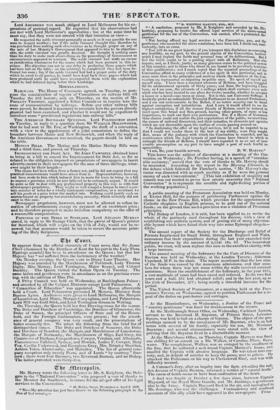Vibe iffittropolis.
Mr. Harvey- wrote the following letter to Mr. S. Knighton, the Dele- gate to the " National Convention " who proposed a vote of thanks to the Member for Southwark, in return for the alleged offer of his legal. services to the Convention.
" 46, Brido Street, Westminster, April 6, ]8311.
" Sir—My attention has just been drawn to the following paragraph in the San of last evening— • " D. WHITTLE HARVEY, rso.,.m.r.
" A. resolution, proposed by Mr. S. Knighton and seconded by Mr. Pit. keithley, proposing to receive the offered legal services of the above-named gentleman for the use of the Convention, was carried, after a protracted dis. cussion.'
"Not having offered my legal services to the Convention, you, and the gentleman who seconded the above resolution, have been led, I doubt not, inad- vertently, into an error.
"You will do ins great injustice if you interpret this disclaimer as conveying any hostility, on my part, to the general objects of the Convention, however much I may deplore the feeble and personal tone of its deliberations. But I feel the truth ought. to be a guiding object with all Reformers. Men who impute, and, as 1 think, justly, so many grievous errors to the political system of this country, and to those who direct it, are bound to be peculiarly tenacious of this qualification ; and I much regret that the reported proceedings of the Convention afford so ninny evidences of a lax spirit in this particular, and in none snore than in the principles and motives which the members of the Con- vention are represented as imputing to public men. To speak of myself and myself only. I have been a constant advocate of Reform, and have straggled for its advancement upwards of thirty years; and from the beginning lhave been, as I am now, the advocate of a suffrage which shall embrace every male adult who has been located in one place for tvelve'months, whether he occupies a house or a hovel—one room or many. Yet is this not Universal Suffrage. I decidedly prefer an indissoluble Triennial Parliament to an Annual Parliament; and 1 am not unfavourable to the Ballot, if no better security can be found against corruption and intimidation. And I own it would afford to me the highest satisfaction, if all the sincere friends of Reform could be induced to meet upon this broad and firm ground, leaving other points, of more or less importance, to work out their own pretensions. For if a House of Commons thus chosen could not realize the just expectations of the public, we must trace the causes of national discontent, and their remedies, to elements and agencies which are not discernible upon the surface of events passing around us.
" In disclaiming the offer of my legal services, let it not be imputed to ale that I would not render theta to the best of my ability, were they sought. But, aware of the jealousy with which the Convention is regarded, and the contrivances which the legal tyrants of past times have framed in which to entangle the friends of Reform, I should have regarded it as an act of inex- cusable presumption on my part to have sought a post of such fearful re. sponsibility.
"1 am, Sir, your humble servant, D. W. HARVEY."
This letter was the subject of discussion at a meeting of the Con- vention on Wednesday ; Dr. Fletcher having, in a speech of " consider- able acrimony," moved that the vote of thanks to Mr. Harvey should be rescinded. According to the report in the Morning Chronicle, in the debate which followed Dr Fletcher's motion, " Mr. Harvey's cha- racter was dissected with as much acerbity as if he were the personal
enemy of each Conventionist." This last exhibition of stupidity and conceit was not needed to prove how utterly unworthy this ` National Convention" is to represent the sensible and right-feeling portion of the working population.]


























 Previous page
Previous page